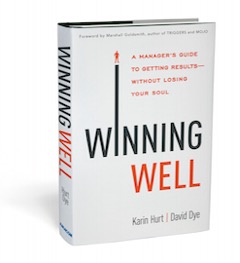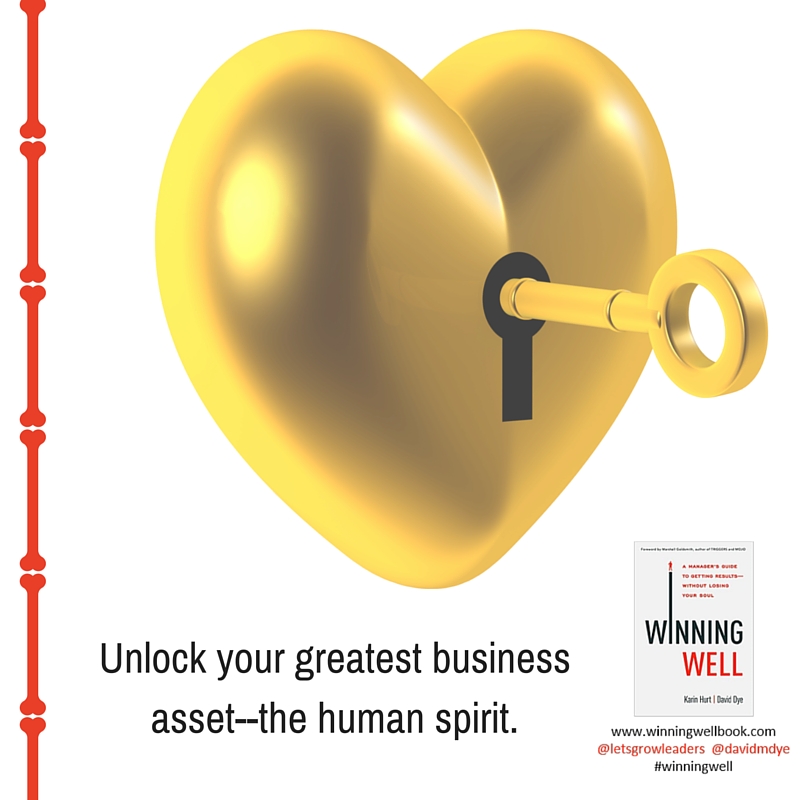I’m thrilled to share this guest post from Karin Hurt and David Dye. Their new book, Winning Well, is a must-read for leaders everywhere.
_____
Karin’s German friend would call trying to fix a negative workplace, “Furzen gegen den Donner.” In English, that’s “farting against thunder.” That’s the situation where Janet, a financial services manager, found herself.
Janet’s supervisory situation seemed pretty futile: little to no recognition, development, or teamwork combined with long hours, limited resources, lots of finger-pointing, and the uncertainty of a new acquisition and consolidation.
When Janet tried to get a list of the company values, no one seemed to know where to find them.
The veterans knew they existed somewhere. They were as hard to find as the vacation policy no one took seriously. Leaders were fleeing this negative workplace every day. And yet Janet had made a deliberate decision to stay and was pulling people together to improve the situation.
Karin asked her why.
“I used to feel like I needed to get out of here, but now I’m so excited to be part of the solution. It is fulfilling to see progress. I know I may lose my job in a year or so, but for now this feels like important work.”
Winning Well in a Negative Workplace
Important work, indeed. Janet was doing her best to be a role model of Winning Well, even in less-than-ideal circumstances. It’s far easier to run away, but the world needs people who dive deeper to change a negative workplace. Here are some tips that can help.
1. Make a list of what you like most about your job.
Share it with others. Ask them what they like most about their jobs.
2. Ask people why they work.
In a negative environment, the answer may seem obvious—“For the paycheck, stupid”—but take it a step further. Do they work to support their sick mom? To pay back student loans? To save for their children’s education? Because they enjoy helping customers? Reconnecting to the purpose of work can help make the smaller annoyances less frustrating.
3. Call out negativity.
When you see negative thinking or actions, talk to the person privately to call it out, particularly if other leaders are involved. When negative attitudes and talk are all around, it’s tempting to ignore it. Raise the bar and change the conversation.
4. Rise above the drama.
Refuse to get sucked into the rumors and gossip. Respond to your team’s concerns with transparency and candor. Be the one who people know they can trust for a straight answer.
5. Find kindred spirits.
Not everyone is negative, although it can feel that way at times. Look around and find other folks trying to change the scene for the better. There is strength in numbers. Look outside your organization as well.
6. Create an “envelope of excellence” or cultural oasis.
It’s easy to feel overwhelmed trying to the overall culture. Start with your own team and do what you can to make it feel better to come to work.
7. Find reasons to celebrate.
With all the negativity, it’s easy to overlook the good. Go out of your way to recognize and celebrate small wins. Substitute weak phrases like “No problem” with more enthusiastic words like “I’d be happy to.”
8. See barriers as a challenge.
Encourage your team to embrace the problems they see as opportunities and challenges to learn and grow. Recap learning along the way to help them feel a sense of positive momentum even during the most challenging times.
9. Laugh more.
Karin had one colleague who would respond to the company’s most ridiculous political nonsense by reminding the team, “It’s all comedy.” Step back and recognize how ridiculous some behavior is. You’ll create a healthy distance from which to respond more appropriately.
10. Hold deeper developmental conversations.
In periods of uncertainty, people yearn for a sense of control and connection. Take your developmental conversations to the next level. Ask your team and your peers I
Your Turn
In our book, Winning Well, we help our readers build their personalize Winning Well action plan. Here are few questions to ask yourself if you find yourself trying to lead well in a negative environment.
1. What do you like most about your job?
2. What about your job frustrates you? What are three “How can I . . . ?” questions you can ask yourself to take responsibility and improve your situation? Ask them and write down your answers.
3. What are you doing to take care of yourself? What one thing could you add to your daily routine that would make you feel healthier?
4. How can you create an envelope of excellence for you and your people regardless of what’s happening in the rest of your organization?
5. Are you feeling particularly disgruntled, trapped, in conflict with yourself, or underutilized? If so, how can you work to improve your situation within either your current organization or another one?
 Karin Hurt (Baltimore, MD) is a top leadership consultant and CEO of Let’s Grow Leaders. A former Verizon Wireless executive, she was named to Inc. Magazine’s list of great leadership speakers.
Karin Hurt (Baltimore, MD) is a top leadership consultant and CEO of Let’s Grow Leaders. A former Verizon Wireless executive, she was named to Inc. Magazine’s list of great leadership speakers.
David Dye (Denver, CO) is a former nonprofit executive, elected official, award-winning author, and president of Trailblaze, Inc., a leadership training and consulting firm.
For more information, or to download a free chapter visit WinningWellBook.com



Alli, Thanks so much for spreading the Winning Well word. David and I so appreciate your support.
My pleasure, Karin! All the best to you and David!
Thanks for sharing Alli!
I’m enjoying the synergy they are creating together!
Me too, Chery. Wonderful to see and support!
Hi Alli,
What a great post. As you may know, I have my own issues with my full-time outside of home job but thankfully, things will be changing soon. However, for about the past 3 years, I’ve been so miserable I’ve had to take anti-anxiety pills to get me to go to work. Ugh, so terrible!
This looks like a really good book. Definitely going to take a peek!
B